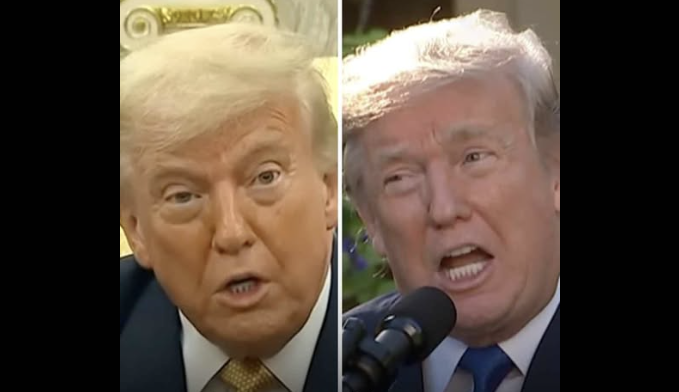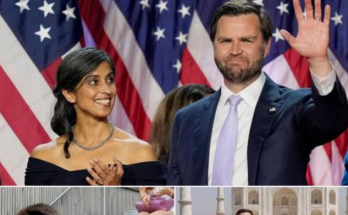Trump’s Jerome Powell Gaffe: A Glimpse Into Memory, Politics, and Public Perception
A recent video featuring former President Donald Trump has reignited concerns about his memory and mental sharpness, following a striking gaffe during a press briefing in the Oval Office. In the clip, Trump refers to Federal Reserve Chair Jerome Powell as a “terrible” choice and criticizes President Joe Biden for having “put him in and extended him.” The only problem: Trump himself appointed Powell in 2017. The misstatement, followed by a partial correction mid-speech, has sparked a storm of reaction on social media and among political commentators, with many raising questions about Trump’s cognitive state, hypocrisy, and fitness for office.
The Incident in Context
Jerome Powell, a Republican and a former investment banker, was nominated by Trump to head the Federal Reserve in November 2017, replacing Janet Yellen. Though initially praised by Trump, Powell quickly fell out of favor with the former president over interest rate hikes that Trump believed were stifling economic growth. By 2019, Trump had begun publicly criticizing Powell, even floating the idea of removing him from the role — something a president cannot do easily under existing laws.
During the recent press interaction, Trump appeared to conflate Powell’s reappointment by Biden in 2021 with his original nomination. His statement, “Joe Biden put him in and extended him,” was immediately flagged by journalists and social media users as factually incorrect. Trump then pivoted, revising his critique to focus on Biden’s decision to extend Powell’s tenure — a significant but separate issue.
Social Media and Public Reaction
As the video went viral, it generated a wave of commentary from across the political spectrum. Some users saw it as a harmless slip of memory, understandable given the complex and sometimes overlapping political appointments that span multiple administrations. Others viewed it as part of a larger and more concerning pattern — one that suggests Donald Trump, now in his late 70s, may be experiencing cognitive decline.
A viral post on X (formerly Twitter) stated: “He can’t even remember appointing the Fed Chair—yet wants control of the economy and nuclear codes? If Biden did this, the media would erupt.” Others accused Trump of hypocrisy, noting that he has frequently mocked Joe Biden’s verbal missteps and lapses as signs of senility. “What’s the difference between a Biden blunder and a Trump one? About 10,000 retweets,” quipped one user, underscoring the partisan lens through which such incidents are viewed.
In addition to criticism, many internet users responded with sarcasm and humor. Memes comparing Trump’s confusion to Biden’s frequent speaking stumbles proliferated. Some joked about creating a “Presidential Memory Olympics,” while others sarcastically welcomed Trump to the club of “leaders forgetting what they did five years ago.”
A Broader Debate About Cognitive Fitness
The Trump-Powell gaffe touches a nerve in American politics because it aligns with a growing and bipartisan concern: whether the current generation of leaders, many of whom are well into their 70s and 80s, are mentally fit to lead the country. This concern has been especially prominent in the 2024 and 2025 election cycles, as Trump and Biden remain the two dominant political figures despite their advanced ages.
According to recent polling, a significant portion of American voters — including majorities from both major parties — have expressed concerns about the cognitive abilities of older candidates. In Biden’s case, his occasional disoriented behavior and stuttering have been a constant source of Republican criticism. Now, with Trump making a high-profile factual error about his own presidency, critics are suggesting that both men deserve equal scrutiny.
Medical professionals have weighed in cautiously. While Trump’s physicians have previously declared him “in excellent health,” such statements are often criticized for lacking transparency. Mental fitness evaluations are not mandatory for presidents or candidates, and cognitive lapses can be hard to interpret in isolation. Still, repeated instances of factual confusion — especially about high-profile decisions like major appointments — inevitably raise public doubts.
The Political Strategy Behind the Blame
Beyond cognitive concerns, Trump’s statement also invites analysis from a political strategy perspective. By blaming Biden for Powell’s performance, Trump may have been attempting to deflect responsibility for a Fed Chair whose policies he came to oppose. Criticizing the Federal Reserve has long been a favorite tactic of politicians looking to assign blame for inflation or economic volatility. By suggesting that Powell is “Biden’s problem,” Trump could be seeking to create distance between himself and any unpopular economic developments.
However, the strategy backfired in this instance. Not only did it lead to public mockery, but it also reminded voters that Trump’s own decision-making has contributed to the current state of the U.S. economy. For those closely following economic policy, this is a rare example of a politician being caught misrepresenting their own record — and being called out in real time.
Media Double Standards and Selective Outrage
One of the more interesting side discussions stemming from the incident is the perceived double standard in how the media and public react to gaffes by different political figures. Many liberal commentators have argued that Trump’s missteps don’t receive the same level of media scrutiny as Biden’s. Conversely, Trump supporters argue that the press gives Biden a pass while pouncing on every Trump slip.
This dynamic reflects a broader problem in American political discourse: partisanship often determines not only the interpretation of events but even the basic facts people accept. Whether Trump’s comment is seen as a harmless lapse, a sign of cognitive decline, or a calculated lie may depend less on evidence than on political alignment.
Implications for 2025 and Beyond
As both Trump and Biden continue to prepare for the 2025 presidential race — potentially a rematch of the 2020 contest — every public appearance is likely to be dissected for signs of aging, confusion, or mental frailty. The Powell incident, while minor in isolation, will likely become part of a growing arsenal of video clips and quotes used by each side to portray the other as unfit.
For undecided voters, the issue of cognitive fitness could play a pivotal role. With the stakes of presidential leadership so high — involving decisions on war, the economy, and national security — the public is understandably cautious about placing trust in candidates who appear disoriented or factually confused.
Conclusion
The controversy surrounding Trump’s misstatement about Jerome Powell is more than just a viral moment or a political gaffe. It highlights the real and growing concern among Americans about the age, memory, and mental readiness of their political leaders. While Trump attempted to distance himself from Powell’s record by falsely attributing his appointment to Biden, the backlash revealed a more serious undercurrent: that even past presidents may struggle to remember their own actions — and that the public is watching more closely than ever.
As the nation heads into another heated election cycle, incidents like this are a reminder that leadership requires not only strong policies but clarity, accountability, and, yes, a firm grasp of the facts.



